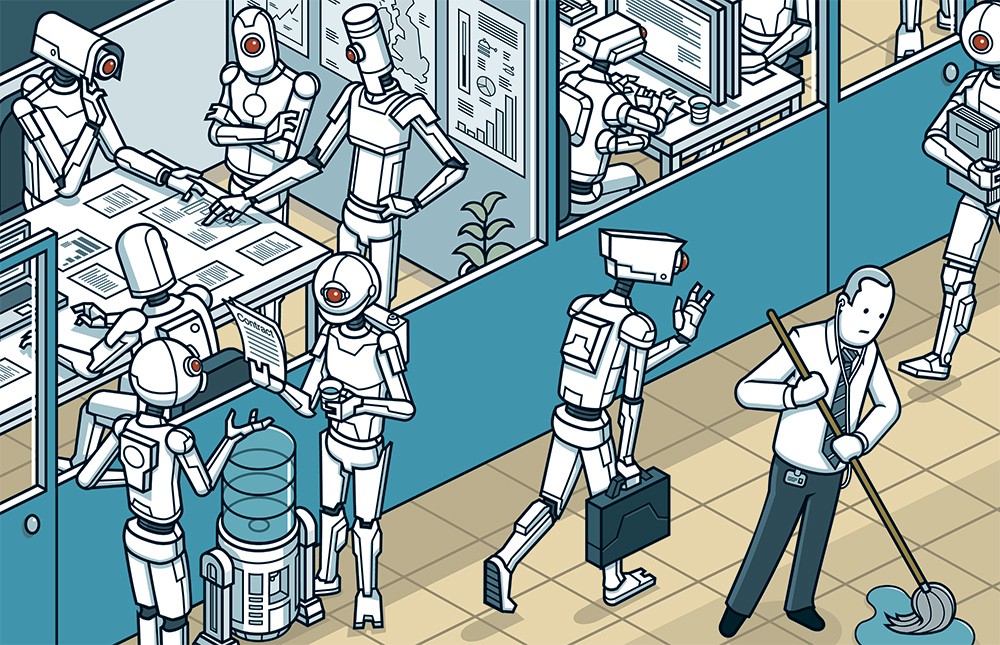Lest you think I’m gonna come out swinging re: automation, no, it’s not really that. I’ve done that before, tho!
Actually, by way of quick story before we get into this, in July ’19 I went to Richmond with some of my friends. Because that was eight months prior to COVID, I haven’t seen most of those people since — and because Trump vs. Biden plus adult responsibilities wedged that group anyway, who knows if I’ll see them again anytime soon?
Anyway, we were in this breakfast cafe joint in Richmond and broadly discussing life on a semi-hungover Saturday morning. Most people at the table had 2-3 kids, usually under 7. Somehow the idea of employment vs. unemployment and “full employment,” a term economists themselves barely understand, came up. It’s an amazing fact that everyone with kids automatically thinks their kids will be fine — is that love? — but one of the guys with three kids is like “Pfft, automation is bullshit, there will be jobs when my kids are 25.” In July ’19, I had just been piped out of this marketing agency job about seven weeks before and I was doing a shit-ton of day drinking, so I knew a bit about the “removal of vocational purpose from the male.” (That will be the title of a paper I eventually write.) We got pretty animated for 12 seconds, then I went back to my breakfast burrito, which was admittedly pretty tasty.
That’s a long way of getting to this, from a Wharton rundown of life post-COVID:
We have to go back to the original reason firms exist. We prefer hiring someone for a full-time job, even though we need them only for a relatively short amount of time, just because of the complexity of the hiring, retaining, and managing the relationship with them. However, the complexity is being diminished and the frictions of hiring short-term workers are being reduced. In a few years, the notion of a full-time employee may be a relic of the past. As more platforms emerge, more employees join this type of work and more customers rely on these platforms, the already humming economy-level gig flywheel will only accelerate. Firms are still going to be employing generalists, but for almost everything that needs a specialist, they may rely on the gig economy.
Bunch to unpack here, so let’s kinda sorta start it up.
Will full-time jobs go away?
Completely away? No. It’s too ingrained in culture and moving through life. Largely away? Yes. That will occur at an intersection of cost containment, automation, sheer human greed, tech stacks getting smarter, and the gig economy. Here’s something I once wrote about that.
Do I think this will happen tomorrow? No. We’re still in a spot where it’s very important to founders and executives to be seen as “growing,” and beyond revenue/markets, the easiest way to show “growth” is through hiring and headcount, even if most execs have no idea what all these “strategic account managers” do all day. The growth focus does create a shitty boom/bust cycle where you hire when you’re hitting numbers, then you layoff tons when you hit the skids, and for most of us, we just have to accept that as “adulthood.”
Gig economy is perhaps a better way through but there are also clear limitations, including lack of obvious safety nets, insurance, and not everyone has skills that are transferable to “gig.” I don’t think the grand promise of advanced capitalism was “I am 35 and I deliver burritos,” but to be perfectly honest, I was pretty close to that reality at thirty-six, so what do I know?
In reality, the job market at present is pretty limited to about ages 17-34, relative to industry. Ever heard of something called ageism?
So yes, it’s entirely possible to believe that full-time jobs will exist less and less in the future.
What does that mean societally?
Fuck if I know. I ain’t no futurist, kid! (Is anyone?)
I would say it probably will require some type of reinvention and some type of political and legal investment in what the gig economy means, so that more people can operate as what we currently think of as 1099s, but with a better net.
Maybe it ends up not being a problem with Baby Boomer professional exodus + low fertility rate, numbers-wise — and then we ain’t gotta worry! I mean, isn’t there a “skills gap” at present? (No.)
If you remove work as a source of activity from men especially, you’re going to see two paths — a bunch of men will ideally go do stuff with their hands and become carpenters (“The Jesus Revolution”) and then a bunch of dudes will find ways to make money here and there and alternate between gym, potential fatherhood, and the bar (“The Hybrid Masculinity Approach”). Guys derive a lot of relevance from work, even if don’t always openly admit that. You gradually reduce full-time work options, you got a “male relevance” problem. Know how guys tend to solve for relevance? Sex, alcohol, and heavier weights. Maybe some board-cutting. And in a few random cases, blogging or poetry. (I’m an unique snowflake. Come at me.)
If guys lose professional relevance, this headline also becomes a bigger societal deal:

So, yes, a lot could change. Again, overnight? No. But in 2050, the world of employment will look a good deal different, between automation, incentive structures, geopolitics, and platform economies.
What’s your take?
